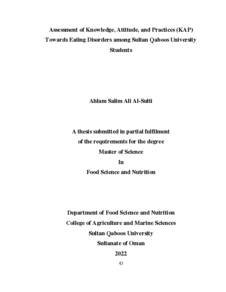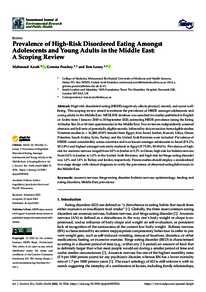Document
Assessment of knowledge, attitude, and practices (KAP) towards eating disorders among Sultan Qaboos University students.
Other titles
تقييم المعرفة و السلوكيات و الممارسات تجاه اضطرابات الأكل لدى طلاب جامعة السلطان قابوس
Publisher
Sultan Qaboos University.
Gregorian
2022
Language
English
English abstract
Eating disorders (EDs) are syndromes characterized by abnormal eating patterns with
extreme weight loss behaviors to avoid weight gain. Anorexia nervosa, bulimia nervosa,
and binge eating disorder are the most common forms of EDs. They constitute a
significant public health problem due to adverse health consequences resulting from
improper eating practices. Eating disorders are a worldwide issue of concern due to their
increasing prevalence among young adults in Arab and non-Arab cultures. They are
associated with diverse biological, psychological, sociocultural, and developmental risk
factors that can lead to several medical complications and psychiatric comorbidities. There
are many studies on the relationships between knowledge, attitudes, and practice (KAP)
related to EDs in the regions of Asia, Europe, and the US; however, it is still an under researched area in the Middle East with insufficient data on KAP in university-going
students. Therefore, this study aimed to assess the KAP towards EDs among
undergraduate students at Sultan Qaboos University in Oman and to identify the
determinants associated with knowledge level, positive attitudes, and appropriate
practices toward EDs. The study sample comprised 239 undergraduate students (175
female and 64 male). The questionnaire was distributed via students' email. Overall, there
were 37 knowledge, 88 attitude, and 65 practice items, the latter two based on a Likert
scale. Descriptive statistics were used to describe participants' baseline characteristics
using mean (standard deviation) for continuous variables and proportions for categorical
variables. Multiple linear regression was used to determine the variables associated with
the KAP scores. Of the 239 participants who completed the questionnaire, 175 (73.22%)
were female. The mean (SD) age of participants was 20.3 (3.0) years and ranged from 17
to 39, and almost all the participants were Omani. There was a considerable level of stress
(the mean (SD) of the Perceived Stress Scale-4 score was 7.51 ± 3). The mean (SD)
knowledge score in our study was 19.69 (5.07); the mean (SD) of the attitudes score was
44.97 (10.74), and the mean (SD) of the practice score was 45.70 (5.62). The multivariable
analysis showed that females had a higher knowledge level than males, and students who
had access to University resources had higher knowledge than students who lacked access
to University resources. Higher body mass index (BMI) was associated with poorer
attitude. Students whose fathers attained lower than master's educational level and those
who did not have access to online EDs resources had poorer attitude scores. Lastly,
increasing BMI was negatively associated with the practice scores. The results revealed a
general lack of knowledge regarding EDs, so educational intervention programs are
needed to enhance knowledge about EDs among university students and to adopt better
attitudes and behaviors.
Member of
Resource URL
Arabic abstract
اضطرابات الأكل ) مثل فقدان الشهية العصبي، والشره المرضي العصبي، واضطرابات الأكل بنهم( هي متلزمات تتميز بإتباع أنماط أكل غير طبيعية يتبعها ممارسة سلوكيات شديدة لخسارة الوزن وتجنب زيادته. تعتبرأمراض اضطرابات الأكل أحد المشاكل الصحية العامه، كما تعتبر مشكلة عالمية بسبب زيادة انتشارها بين فئة الشباب في الدول العربية وغير العربية. يزيد خطر الصابة باضطرابات الأكل مع العوامل البيولوجية والنفسية و والجتماعية و والثقافية والنمائية. ترتبط اضطرابات الأكل بالعديد من المضاعفات الطبيه والمراض النفسية المصاحبة. هناك نقص في الدراسات التي أجريت حول المعرفه، المواقف، والممارسات تجاه اضطرابات الأكل بين المراهقين وطلب الجامعات في الدول العربية والغير عربية. لذلك تهدف هذه الدراسة إلى تقييم المعرفة والسلوكيات والممارسات تجاه اضطرابات الأكل لدى طلب جامعة السلطان قابوس وتهدف أيضا إلى تحديد المحددات المرتبطة ا )175 ً جامعيا ً بمستوى المعرفة والسلوكيات الايجابية والممارسات الملئمة تجاه . وشملت الدراسة على 239 طالب إناث و 64 ذكور( من جامعة السلطان قابوس. وحول الأول الطريقة المتبعه في هذه الدراسة، فإنه تم استخدام استبيان نشرعبر اليميل الجامعي. يحتوي الستبيان على أربعة أقسام: الجزء ول منها يغطي الخصائص الديموغرافية، أما القسام الخرى تتمضن أسئلة حول المعرفة، والسلوكيات والممارسات تجاه اضطرابات الأكل. أوضحت نتائج هذه الدراسة أن مستوى المعرفة لدى الناث أعلى من الذكور، و أن الطلب الذين يتصفحون من مصادر الجامعة لديهم مستوى أعلى للمعرفة. يرتبط مؤشر كتلة الجسم إرتباط ايجابي مع نتيجة السلوكيات تجاه اضطرابات الأكل، و أن الطلب الذين بلغ المستوى التعليمي لوالديهم أقل من درجة الماجستير لديهم سلوكيات سيئة تجاه اضطرابات الأكل، وأن تصفح الانترنت يرتبط ارتباط سلبي مع نتيجة السلوكيات تجاه اضطرابات الأكل. كما أن مؤشر كتلة الجسم يرتبط ارتباط سلبي بنتائج الممارسة تجاه اضطرابات الأكل. كما أوضحت نتائج هذه الدراسة وجود نقص عام في المعرفة فيما يتعلق باضطرابات الأكل، وبالتالي هناك حاجة ضرورية لبرامج التدخل التعليمي لتعزيز المعرفة حول اضطرابات الأكل واتباع سلوكيات وممارسات أفضل.
Category
Theses and Dissertations


